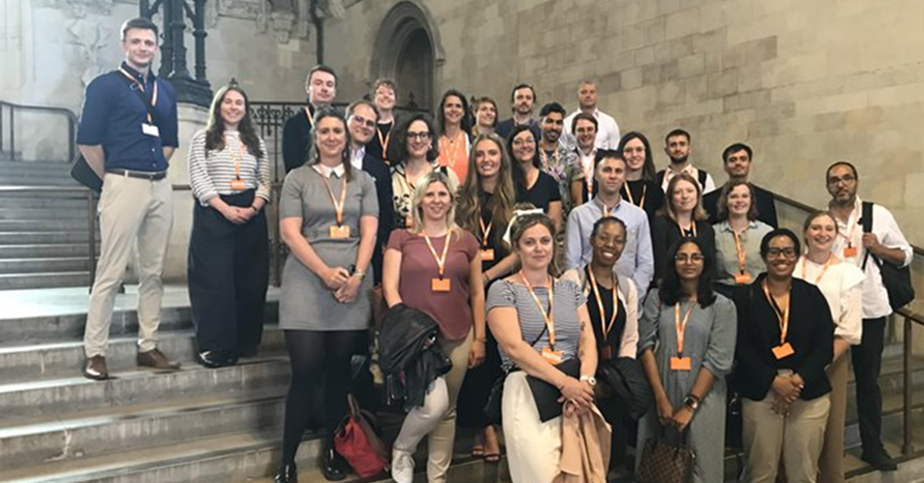FST BLOG
We welcome blogs on issues across Science, Technology, Research and Innovation, and on the activities of the Foundation. To publish a blog on this site, please email communications@foundation.org.uk.
Note: The Foundation for Science and Technology is strictly neutral. Any views expressed in these blogs are those of the authors and not of the Foundation.
Building an Interdisciplinary Mindset: What the Space Studies Programme taught me about the future of space

- 19 January, 2026
- Education, Technology
- Lauren Taylor
Lauren Taylor, Major Projects Lead at the UK Space Agency and 2025 Foundation Future Leader, explores the importance of interdisciplinary work within space, the interconnections between art and science and her voluntary role as Science, Technology, Engineering and Maths (STEM) Ambassador.
Read MoreThe FST appoints Dr Alex Rhys OBE as Chief Executive

- 9 January, 2026
- General
- Charlotte Raynsford
The Foundation for Science and Technology (FST) is delighted to announce the appointment of Dr Alex Rhys OBE as its new Chief Executive Officer.
Read MoreFrom publications to public actions: the case for responsible science activism

- 7 October, 2025
- Dr Tracey Elliott
In a world in which evidence-informed policy making is struggling in the face of populism and climate inactivity, some scientists have turned to more activist approaches, bringing evidence AND emotion into national and international debate. How should the government, universities and researchers themselves respond?
Read MoreWhat it means to be a Foundation Future Leader

- 22 August, 2025
- Education, General
- Dr Tobiasz Trawiński
2025 Foundation Future Leader, Dr Tobiasz Trawiński, Senior Lecturer in Psychology at Liverpool Hope University, talks about his experience on the programme.
Read MoreCompute and Contribute: Data Centres’ Role in the Green Grid

- 30 May, 2025
- General, Technology
- Ben Pritchard
As the world accelerates its AI ambitions through a wave of data centres, including new supercomputing hubs, one challenge looms large: power. Meeting the scale, speed, and resilience demands of AI workloads will require more than just grid connections.
Read MoreHow social sciences are essential in the UK's net zero transition

- 21 May, 2025
- Environment, Technology
- Professor Karen Bickerstaff
In this piece, Professor Karen Bickerstaff, Leverhulme Trust Research Fellow and Lead on the ACCESS (Advancing Capacity in Climate and Environment Social Science) report Making a Net Zero Society – Follow the Social Science, highlights how the social sciences offer essential perspectives to support a rapid transition to a net zero UK.
Read MoreSHAPEing the Decarbonisation Transition in the Built Environment - Balancing Efficiency and Resilience

- 9 May, 2025
- Education, Environment, General, Technology
- Dr Jill Zhao
The integration of SHAPE research in UK’s route to Net Zero is essential for addressing the complex challenges of decarbonising the built environment. SHAPE research contributes to understanding how policies are received by the public, how they align with cultural norms, and how they can be framed to foster engagement and compliance.
Read MoreHow We Can Use Advanced Materials to Make the UK a Key Link in the Global Semiconductor Supply Chain

- 11 April, 2025
- Business, Technology
- John Tingay
Global supply chains are growing more complex and more fraught, and evidence for that trend is particularly acute in the case of semiconductors. The tiny ‘chips’ encapsulate a world of material, economic and political concerns. However, by investing in advanced materials, there is an opportunity for the UK to establish a substantial foothold in future supply chains.
Read MoreHow Learned and Professional Societies can play a role in evidence-based knowledge sharing

- 21 March, 2025
- Education, General
- Simon Napper
As the proliferation of views, all claiming to be authoritative, has grown over time, so has the need for trustworthy analysis and verification of facts. As guardians of expertise and best practice, Learned and Professional Societies can play a key role in this.
Read MoreAn atom’s eye view inside materials: from cells to circuit boards, and meteorites to magnets

- 7 February, 2025
- Technology
- Dr Rosie de Laune
The UK’s ISIS neutron and muon source has welcomed over 60,000 scientists since it began operations in 1984. The variety of ISIS research is demonstrated in this blog through the perspective of three ISIS scientists who have been fellows of the Foundation Future Leaders (FFL) programme.
Read More